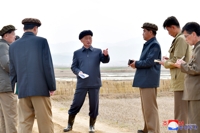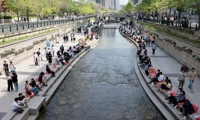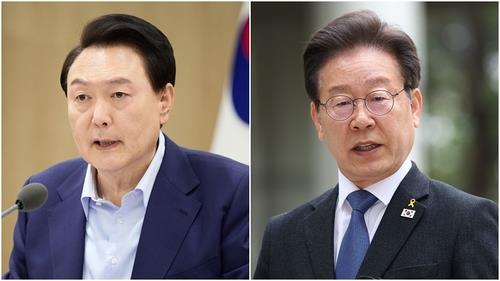(EDITORIAL from Korea JoongAng Daily on Oct. 18)
Workweek confusion
As a presidential candidate, Moon Jae-in vowed to shorten South Korea’s notoriously rigorous work hours to give workers more time for leisure.
By making companies comply with the legal 52-hour work week, he aspired to create an extra 24,000 jobs. Under the administrative act and labor basic law, which do not count weekend work as overtime, Korean employers are able to make employees work up to 68 hours a week.
As of 2013, Koreans worked 2,057 hours a year, much more than the average of 1,706 hours among the member countries of the Organization for Economic Cooperation and Development.
In September 2015, a tripartite committee of representatives from the government, corporate sector and unions agreed to count weekend work as overtime to cap weekly work hours at 52 hours — 40 of regular work plus 12 hours of overtime.
But that agreement has never been legalized as the revised bill was tied to other labor reform laws that did not pass the previous National Assembly.
Presiding over a senior secretariat meeting on Tuesday, Moon said that if the revised bill does not pass the National Assembly, he would order the government to redefine the administrative act to ensure the legal hours are met.
He may have been trying to pressure the National Assembly. But tweaking administrative definitions will only add to confusion in workplaces.
Ambiguity in legal definitions has set off lawsuits over what constitutes a base salary. Employers faced a slew of lawsuits by unions after the Supreme Court did not agree with the 1988 administrative guideline that left bonuses out of the base salary.
The revised work hours must be absolutely clear legally in order to prevent disputes later on. According to a recent survey by the Economic Reform Research Institute, as many as 53.3 percent of respondents did not think the new government’s policy on jobs has promoted new hiring.
Most negative response came from young job-seekers, which shows the current job policy mostly benefits employed and unionized workers.
kokobj@yna.co.kr
(END)
-
 Overdue debut of Korean abstract art pioneer Yoo Young-kuk at Venice Biennale
Overdue debut of Korean abstract art pioneer Yoo Young-kuk at Venice Biennale -
 Defense chief says N. Korea's hypersonic missile 'unsuccessful' in last-stage glide flight
Defense chief says N. Korea's hypersonic missile 'unsuccessful' in last-stage glide flight -
 Relax, immerse yourself in scents at Venice Biennale's Korean Pavilion
Relax, immerse yourself in scents at Venice Biennale's Korean Pavilion -
 N. Korea has capability to genetically engineer biological military products: U.S. report
N. Korea has capability to genetically engineer biological military products: U.S. report -
 S. Korea marks 30th anniv. of Korean Pavilion at Venice Biennale with contemporary art
S. Korea marks 30th anniv. of Korean Pavilion at Venice Biennale with contemporary art
-
 Overdue debut of Korean abstract art pioneer Yoo Young-kuk at Venice Biennale
Overdue debut of Korean abstract art pioneer Yoo Young-kuk at Venice Biennale -
 Relax, immerse yourself in scents at Venice Biennale's Korean Pavilion
Relax, immerse yourself in scents at Venice Biennale's Korean Pavilion -
 Artist Lee Bae captures ethereal Korean aesthetics at Venice Biennale
Artist Lee Bae captures ethereal Korean aesthetics at Venice Biennale -
 S. Korea marks 30th anniv. of Korean Pavilion at Venice Biennale with contemporary art
S. Korea marks 30th anniv. of Korean Pavilion at Venice Biennale with contemporary art -
 Defense chief says N. Korea's hypersonic missile 'unsuccessful' in last-stage glide flight
Defense chief says N. Korea's hypersonic missile 'unsuccessful' in last-stage glide flight
-
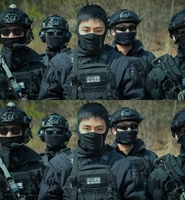 Facebook page unveils photos of BTS member V in counter-terrorism unit gear
Facebook page unveils photos of BTS member V in counter-terrorism unit gear -
 Gov't likely to accept university chiefs' request to lower med school enrollment quota
Gov't likely to accept university chiefs' request to lower med school enrollment quota -
 S. Korea not invited to G7 summit meeting this year: sources
S. Korea not invited to G7 summit meeting this year: sources -
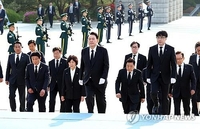 Yoon's approval rating sinks to lowest point since taking office
Yoon's approval rating sinks to lowest point since taking office -
 S. Korea to fully shift to 'endemic' from COVID-19 pandemic starting next month
S. Korea to fully shift to 'endemic' from COVID-19 pandemic starting next month















